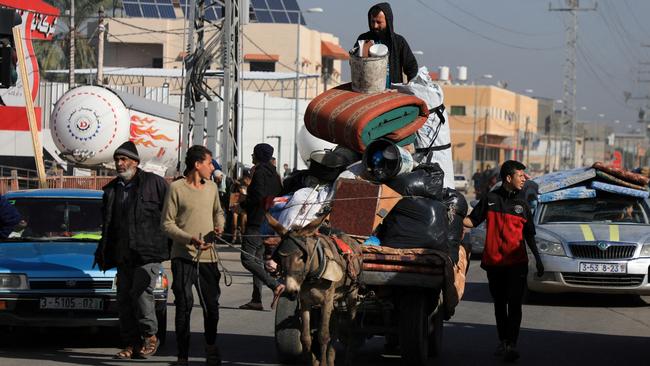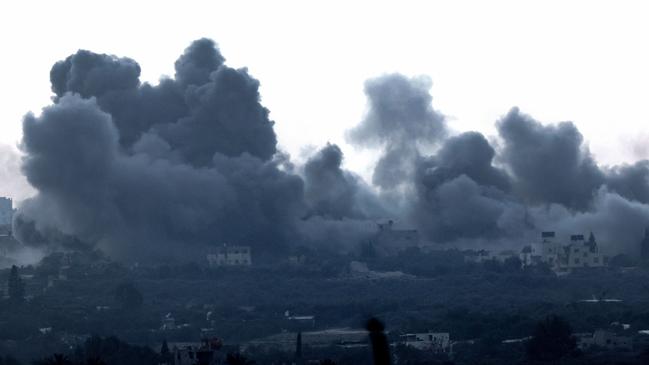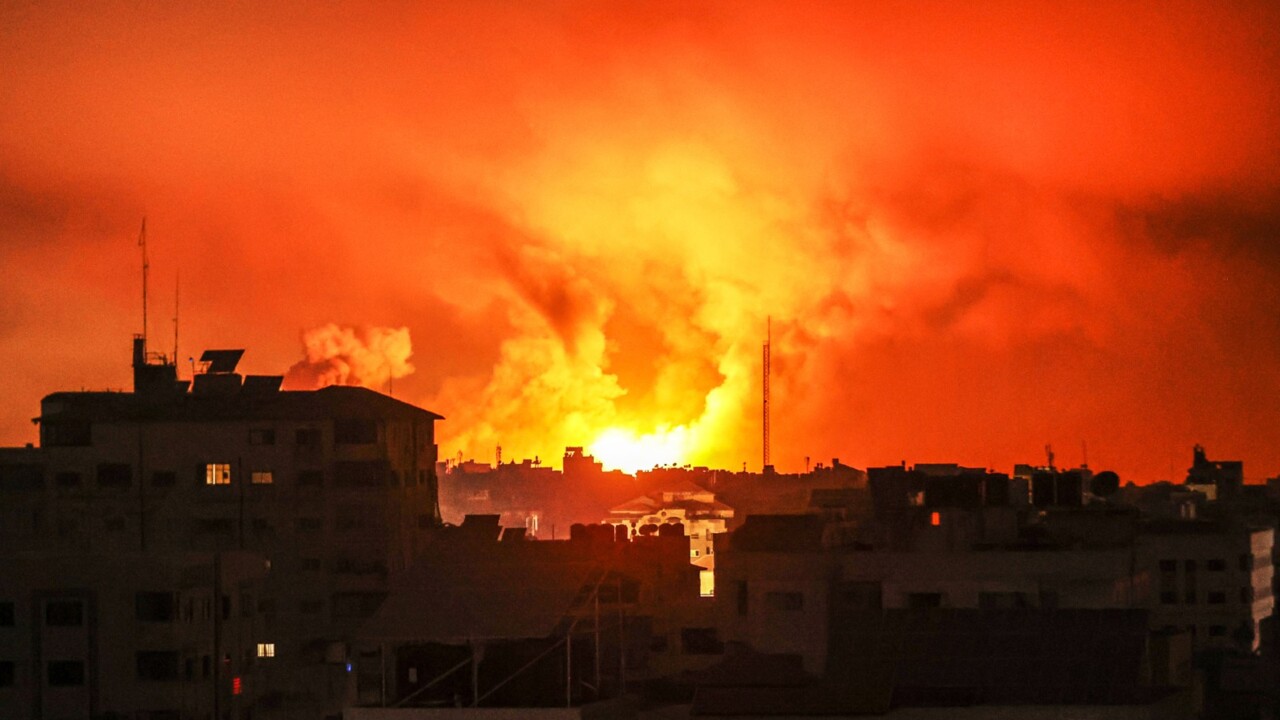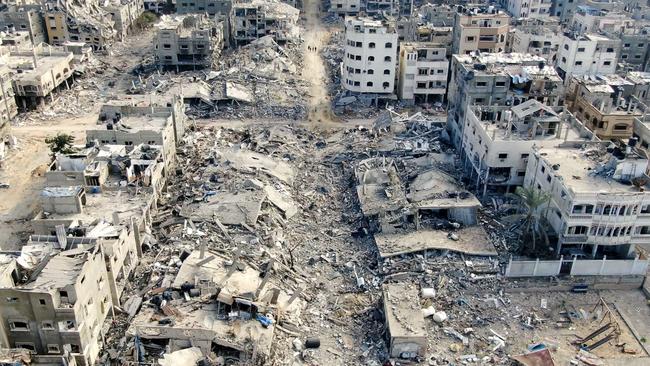Israel intensifies offensive in Gaza Strip refugee camps
Uncertainty over where the IDF would strike next has prompted many residents to flee, even from areas not yet under an evacuation order.

Israeli forces intensified their ground offensive in refugee camps in the central Gaza Strip, as fighting continued to drive Palestinian civilians into shrinking and overcrowded areas in search of safety.
Meanwhile, Egyptian officials worked with Qatar to advance a multiphased proposal to end the war — a plan that neither Hamas nor Israel is likely to accept in its current form.
Since the launch of its military operation in October, Israel has struck several refugee camps in Gaza as it seeks to eradicate Hamas, the US-designated terrorist group that launched a bloody attack on Israel on October 7. Israel’s top general, Herzi Halevi, said this week that “the war will continue for many more months,” given the complexity of uprooting Hamas.
After striking targets near the Maghazi camp earlier in the week, Israel on Wednesday instructed civilians living in the camps of Bureij and Nusairat to flee to another central Gazan town, Deir al-Balah.
However, fighting continued in Deir al-Balah, and the Israeli military said it would only suspend hostilities in one of its neighbourhoods for four hours starting Wednesday morning to allow civilians to leave.
Rear Admiral Daniel Hagari, the Israeli military’s chief spokesman, said later Wednesday that Israel was nearing the completion of its offensive in Bureij.
Uncertainty over where Israel would strike next has prompted many residents to flee, even from areas that Israel hasn’t ordered to be evacuated.
“I know my area is not safe, but I don’t know where I should go?” said Osama Humaid, a 35-year-old social-media consultant living in the Nusairat camp.
His block wasn’t among the areas that Israel said should be evacuated. But since Israel had told civilians to leave the neighbouring block, he considered fleeing. Yet, Deir al-Balah, where Israel asked civilians to go, was already overcrowded.

“Where should all these people in Al-Nusairat or Al-Maghazi go?” Humaid said.
Ali Ghazi, a displaced father of six in Maghazi, said people there were surprised by the shelling and that residents weren’t sure whether their specific area should evacuate. “The situation is very dangerous and we moved far away, but the roads are closed and we don’t know where people are going,” he said. For much of the past week, the area has been a “living hell,” he said.
Israel launched its war on Gaza after the Hamas-led attacks on October 7 that Israel says killed about 1200 people, most of them civilians. More than 21,000 Palestinians, mostly women and children, have been killed during Israel’s offensive, according to Palestinian health officials. The figures don’t distinguish between civilians and combatants.
Up to 1.9 million people, or more than 85 per cent of Gaza’s population, have been displaced — some of them multiple times — since the Israeli military campaign began, according to the United Nations agency for Palestinian refugees, UNRWA.

Egyptian officials said Wednesday that they have in recent days received suggestions from Israel, Hamas and other parties on how to narrow the differences over Cairo’s peace proposal. Egyptian officials who are working alongside Qatar on the proposal said it would take some time to narrow the gap, given that the plan contains aspects each side finds difficult to accept.
None of the actors, including Israel and Hamas, has privately rejected the Egyptian plan, which is viewed as a starting point for negotiations, the officials said.
The Egyptian proposal calls for an initial pause in fighting to allow for the release of 40 to 50 Israeli hostages currently held by Hamas in exchange for 120 to 150 Palestinian prisoners in Israeli custody. A ceasefire deal would be followed by the formation of a transitional, technocratic government for the Gaza Strip and the West Bank made up of various Palestinian factions, including Hamas and its Palestinian rival, Fatah.
The long-term governance of Gaza — which would require Hamas and Fatah to work together — is the biggest sticking point, the Egyptian officials said.
Israeli officials have said it is unlikely that Israel can agree to any deal that would involve a role for Hamas. Israel’s government reviewed the deal this week.
Israeli Finance Minister Bezalel Smotrich said Wednesday that Israel’s full cabinet, required to approve any deal that includes prisoner releases, is committed to neutering Hamas’s ability to threaten Israel from Gaza.

“We are determined to deliver a victory. There is an understanding on behalf of all parties in the cabinet that the State of Israel cannot accept a situation in which (it lives) alongside a threat, and we are determined to destroy Hamas,” said Smotrich, who also sits on Israel’s security cabinet.
Hamas’s leader in Gaza, Yahya Sinwar, is unlikely to accept a deal that would see him relinquish power and release Israeli hostages. In turn, Palestinian Authority President Mahmoud Abbas has agreed to revamp the organisation but is pushing back on immediate elections that would entail him relinquishing power. Such elections are currently part of the Egyptian proposal.
Israel has faced international pressure to limit civilian casualties in Gaza but says the war is complicated by Hamas’s strategy of embedding itself within and below civilian centres, including in its extensive underground tunnel network.
Analysts say the tactical changes are aimed primarily at penetrating tunnels, which is Israel’s greatest challenge on the battlefield.
Taking control of the central Gaza camps would create a continuous line of control between Israeli ground troops in the north and activities in the southern city of Khan Younis, said Shalom Ben Hanan, a former senior Israeli intelligence official. One of Hamas’s five brigades is embedded in the tunnels beneath the camps, he said.
Hagari, the Israeli military spokesman, said Wednesday that Israel had added an extra brigade to its offensive in Khan Younis, which Israel says is a Hamas stronghold.
The military campaign is taking a growing toll on Israeli forces. Twelve Israeli soldiers have been killed since Monday, bringing the total Israeli military death toll since the start of the invasion in late October to 164. More than 870 Israeli soldiers have been wounded, according to the Israeli military.
Gaza’s refugee camps have been particularly vulnerable during the war. Unlike refugee camps elsewhere in the world, Gazan camps aren’t tent cities. Refugee camps in the enclave were initially set up to temporarily house about 250,000 of the more than 750,000 Palestinians who were driven from their homes during the 1948 Arab-Israel war following the establishment of the state of Israel. Some 1.7 million Gazans, about three in four of the Gaza Strip’s residents, are registered refugees and are stateless.
The eight camps in Gaza have long since become permanent, constituting some of the most densely populated settlements in the world. Apartment blocks, shops and markets are linked by narrow alleyways. As Gaza’s population ballooned over the decades, the camps grew without regulation.
Many structures are unsound and nearly 95 per cent of camp residents were without access to clean water even before the current hostilities began, according to UNRWA. The conditions have worsened since Israel, supported by Egypt, in 2007 imposed a blockade on Gaza after Hamas took power.
Abeer Ayyoub, Fatima AbdulKarim and Anat Peled contributed to this article.
The Wall Street Journal

To join the conversation, please log in. Don't have an account? Register
Join the conversation, you are commenting as Logout